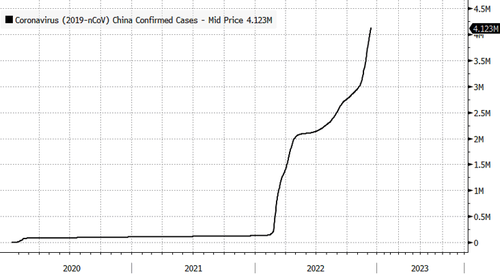
China's government dramatically pivoted from its ultra-harsh 'zero Covid' policy in the last several weeks, which will likely cause a massive outbreak, as health experts urged Beijing to speed up the approval process of new vaccines to counter Covid-19 variants.
Sinovac and Sinopharm Covid jabs have been widely distributed among the majority of the Chinese population to fight the original Covid strain from Wuhan in 2020. But old vaccines might not be enough to fight variants.
"We can't rely on old vaccines which are currently being used nationwide going forward," a Beijing-based adviser to the Chinese Center for Disease Control and Prevention told Financial Times.
The health advisor, who spoke under cover of anonymity, said CDC facilities "are filled with Wuhan virus-based vaccines that aren't of much use."
Beijing has yet to approve the latest version of the jabs to target more infectious Covid variants, leaving the older generation vulnerable this cold season.
According to a new projection by Feng Zijian, a former deputy chief at the CDC, relaxed health restrictions could result in 80 to 90% of the Chinese population being injected with the virus.
"It's going to be inevitable for most of us to get infected once, regardless of how the Covid-fighting measures are adjusted," Feng said.
While China faces a 'winter wave' of deaths as the economy reopens, Beijing has yet to import foreign-made messenger RNA vaccines.
The CDC adviser said that China needed "locally made mRNA vaccines in our toolbox," which might not arrive until "next April." There are seven domestic companies in the late stage of clinical trials. The advisor added clinical trial results for the improved Sinovac and Sinopharm jabs will be announced in March, then "the government may issue an emergency use license."
Jin Dong-yan, a virologist at the University of Hong Kong, said the coming "tsunami" of infections means "China should have an accelerated mechanism for approval to change vaccines based on the circulating strains. There is no need for a full clinical trial."
Infections across the country are already moving higher.
Covid is rapidly spreading through Chinese households and offices after the country's pandemic rules were unexpectedly unwound last week, sparking confusion on the ground as ill-prepared hospitals struggle to deal with a surge in cases. -Bloomberg
Dong-yan warned that by the time new jabs are approved, Covid variants would be the dominant strain:
"The regulatory body needs to show some flexibility. Ba. 5 is already giving way to BQ. 1.1 in the US and XBB in Singapore. He added: "They will never catch up."
So the question we have: Why did Beijing ease zero Covid policies when no preparations have been made to meet the coming winter 'tsunami' of infections?
China’s government dramatically pivoted from its ultra-harsh ‘zero Covid’ policy in the last several weeks, which will likely cause a massive outbreak, as health experts urged Beijing to speed up the approval process of new vaccines to counter Covid-19 variants.
Sinovac and Sinopharm Covid jabs have been widely distributed among the majority of the Chinese population to fight the original Covid strain from Wuhan in 2020. But old vaccines might not be enough to fight variants.
“We can’t rely on old vaccines which are currently being used nationwide going forward,” a Beijing-based adviser to the Chinese Center for Disease Control and Prevention told Financial Times.
The health advisor, who spoke under cover of anonymity, said CDC facilities “are filled with Wuhan virus-based vaccines that aren’t of much use.”
Beijing has yet to approve the latest version of the jabs to target more infectious Covid variants, leaving the older generation vulnerable this cold season.
According to a new projection by Feng Zijian, a former deputy chief at the CDC, relaxed health restrictions could result in 80 to 90% of the Chinese population being injected with the virus.
“It’s going to be inevitable for most of us to get infected once, regardless of how the Covid-fighting measures are adjusted,” Feng said.
While China faces a ‘winter wave’ of deaths as the economy reopens, Beijing has yet to import foreign-made messenger RNA vaccines.
The CDC adviser said that China needed “locally made mRNA vaccines in our toolbox,” which might not arrive until “next April.” There are seven domestic companies in the late stage of clinical trials. The advisor added clinical trial results for the improved Sinovac and Sinopharm jabs will be announced in March, then “the government may issue an emergency use license.”
Jin Dong-yan, a virologist at the University of Hong Kong, said the coming “tsunami” of infections means “China should have an accelerated mechanism for approval to change vaccines based on the circulating strains. There is no need for a full clinical trial.”
Infections across the country are already moving higher.
Covid is rapidly spreading through Chinese households and offices after the country’s pandemic rules were unexpectedly unwound last week, sparking confusion on the ground as ill-prepared hospitals struggle to deal with a surge in cases. -Bloomberg
Dong-yan warned that by the time new jabs are approved, Covid variants would be the dominant strain:
“The regulatory body needs to show some flexibility. Ba. 5 is already giving way to BQ. 1.1 in the US and XBB in Singapore. He added: “They will never catch up.”
So the question we have: Why did Beijing ease zero Covid policies when no preparations have been made to meet the coming winter ‘tsunami’ of infections?
Loading…







